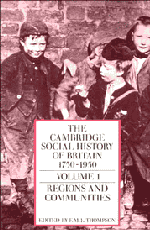1 - Town and city
Published online by Cambridge University Press: 28 March 2008
Summary
A regional approach to social history obviously works primarily within geographical boundaries, and it is the long accumulation of the effects of topography and its influence on patterns of settlement and administrative and economic structures which is at the root of those regional identities that can be observed though the many superimposed layers of national and international forces, religious and class divisions, and inward and outward migration. A simplified picture suggests that by the early seventeenth century Britain possessed a reasonably unified and integrated ruling class, predominantly landed, following on the union of the crowns and the Tudor development of central power. Although the eighteenth century was to be half over before many of the Scottish elements slotted firmly into place in this class, it was one which was broadly homogeneous in culture, in life style and aspirations; its members spoke the same language, if not always the same dialect, until the second half of the nineteenth century, they intermarried freely, and any surviving regional differences between them were romantic displays of custom rather than matters of serious social or political consequence. By the mid-eighteenth century the professional, financial, and mercantile middle class were similarly broadly unified, with value systems and social customs which transcended regional boundaries, although the marked differences between the legal systems of England and Scotland meant that professionally the British legal world has never become fully integrated. It is true that manufacturers and industrialists, who in any case were only beginning to rise above provincial obscurity in the early nineteenth century, stood apart from this bourgeois circle, and to some extent continued to do so into the twentieth century.
- Type
- Chapter
- Information
- The Cambridge Social History of Britain, 1750–1950 , pp. 1 - 86Publisher: Cambridge University PressPrint publication year: 1990
References
- 5
- Cited by



